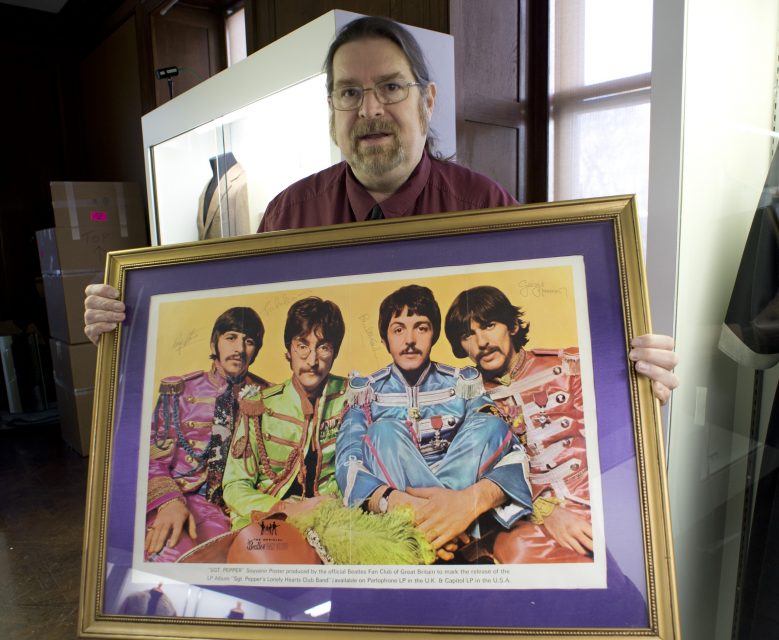
NEW YORK, United States (AFP) – Fifty years ago, The Beatles transformed from floppy-haired boy wonders who wanted to hold your hand to abstruse philosophers whose vision spanned civilizations.
And the effect is still being felt.
“Sgt. Pepper’s Lonely Hearts Club Band” has been called the original concept album and even the greatest album of all time.
Either way, its release half a century ago represented a landmark in music history, with stars once focused on churning out radio-friendly singles newly imagining albums as intricate pieces of art.
The anniversary of the album, which came out on June 2, 1967 in the United States shortly after its British release, has set off a revival of “Sgt. Pepper” which will include weekend commemorations in The Beatles’s native Liverpool.
A reissued edition, with a dynamic mix by the son of Beatles producer George Martin, is forecast to top the next weekly chart in Britain, where “Sgt. Pepper” was already the third top-selling album ever.
“We were always being told, ‘You’re gonna lose all your fans with this one,'” Paul McCartney, the driving force behind the album, told British magazine Mojo for the anniversary.
“And we’d say, ‘Well, we’ll lose some but we’ll gain some. We’ve gotta advance,'” he said.
Start of modern mixing
The album was rooted in a subtle irony. The Beatles, the quintessential pop foursome, performed in character as another, fictional band — “We’re Sgt. Pepper’s Lonely Hearts Club Band / We hope you will enjoy the show,” the opening track declares.
The album was recorded over a then-unthinkable five months as Martin made use of early mixing equipment. The Beatles brought out instruments from an organ to a harmonium to an 18th-century piccolo trumpet, which McCartney had spotted at a televised Bach concert.
On “Lucy in the Sky with Diamonds,” likely the album’s most recognizable track, the musical key rapidly shifted and John Lennon’s voice drifted higher as the recording of his voice was slowed down.
George Harrison, freshly inspired from a retreat to India, played the sitar to merge ragas with Western pop on “Within You Without You” as he reflected on the spiritual quest to control the ego.
Adding to the mystique was groundbreaking cover art.
Instead of glossy photos then in vogue, The Beatles appeared as a brass band surrounded by a motley assortment of historical and contemporary figures from composers to writers to actors.
Even in an age before the internet, the cover spawned conspiracy theories — in particular that McCartney was dead because of a misinterpretation of a badge he was wearing.
Many fans saw hidden meanings in the songs, such as seeing LSD in “Lucy in the Sky with Diamonds.” The quest for secrets was not entirely off the mark, with McCartney later revealing that the album featured a dog whistle inaudible to humans.
Birth of artistic rock
Concept albums were not entirely new.
Jazz, not to mention classical music, had long sought unifying themes.
The Beach Boys a year earlier had released “Pet Sounds,” whose tracks were tied together by an aesthetic, if not a narrative.
Beach Boy leader Brian Wilson was said to have been devastated by the success of “Sgt. Pepper,” contributing to a breakdown as he shelved his mythically unfinished “Smile” album.
“Sgt. Pepper” would have a major influence in years to come as more rock artists conceived of concept albums including The Who and Pink Floyd to, in more recent times, Radiohead and Beyonce.
Roger Waters, the force behind Pink Floyd’s “The Wall,” said he heard “Sgt. Pepper” for the first time on a car radio and he pulled over to listen in amazement.
The Beatles sent a message that “we could be free artists and that there was a value in that freedom,” Waters told US public television.
Rolling Stone magazine ranked “Sgt. Pepper” as the greatest album of all time on its widely read, if inherently controversial, list.
Yet the influence of “Sgt. Pepper” was not immediate. “Sgt. Pepper” kicked off the so-called Summer of Love, with the freshly psychedelic Beatles offering a soundtrack for free-spirited young people.
But by late 1967 rock poet Bob Dylan had returned to his folk roots. The Beatles’ great rivals, the Rolling Stones, also went experimental with “Their Satanic Majesties Request” but by a year later were back to swaggering blues rock.
Stones guitarist Keith Richards remains one unconvinced by “Sgt. Pepper.”
In a 2015 interview, he said The Beatles “got carried away” and made “a mishmash of rubbish.”
© Agence France-Presse








